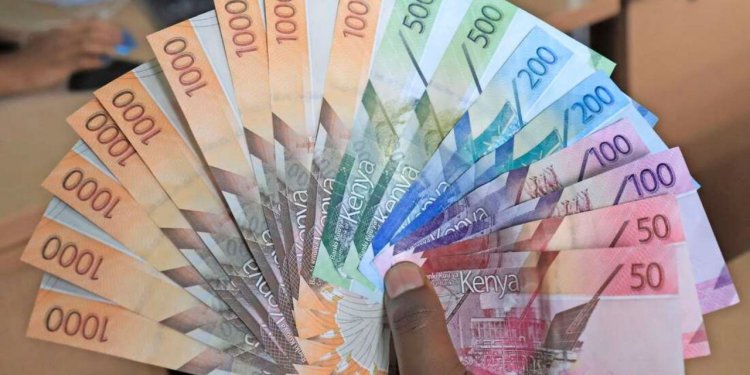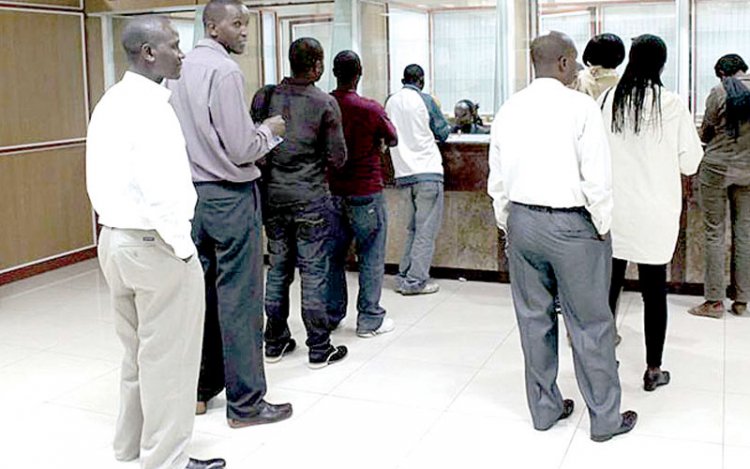Kenyan Banks Will Start Collapsing Soon
Today, about six months into the current government dispensation, Kenya cannot pay salaries, let alone finance its other operations. This is the sad state of affairs that the administration is hiding from Kenyans.

The Kenyan Government’s inability to meet her wage bill is the beginning rung of the spiral to doom. If Robert Mugabe’s Zimbabwe and Idd Amin’s Uganda of the 1970s failure to meet similar obligations is something to go by, then Kenyan banks are headed to a financial cliff… absolute collapse.
Recently, the National Assembly Minority Leader and Ugunja Member of Parliament (MP), Opiyo Wandayi, lamented about delayed salaries, asserting that despite the government’s efforts to increase revenue collection, civil servants and MPs are not being paid.
This came to light because the politicians themselves had not been paid. Our sources tell us that many government workers in quasi-government agencies have gone without pay for up to six months.
"Today, about six months into the current government dispensation, Kenya cannot pay salaries, let alone finance its other operations. This is the sad state of affairs that the administration is hiding from Kenyans.
This is the first time since Kenya’s independence in 1963, the government has been unable to pay salaries to civil servants and members of Parliament. Nearly all civil servants don't know when or if they will ever be paid. The situation has been degenerating progressively since December last year. April 2023 has particularly gotten worse since the non-payment has spread to all sectors of public servants.
With Kenya’s wage bill being at Ksh. 520.03 billion in 2022, the economy is bound to be significantly affected by the government’s inability to pay its civil servants. In Kenya, the government has the highest number of employees in all counties, who contribute to the growth of the economy.
This means that the hundreds of thousands of civil servants who have not been paid are not able to meet their financial obligations.
Since most transactions are done through banks, it is only natural that the banking institutions will miss their own obligations, a fact that would lead to their collapse.

[People standing in a queue at a financial institution to be served. Photo/Courtesy]
Most financial institutions, they hold most of their monies in mortgages. With the civil servants not being paid, leads to them defaulting on their loans. Causing financial strains on the banks, which in turn won’t be able to remit their dues to the Central Bank of Kenya. That will become the beginning of various financial institutions’ downfall.
If that happens, Kenyans should brace themselves for elevated inflation, a further devaluation of the Shilling against the dollar and other world currencies, and skyrocketing prices of consumables and other goods and services.
Due to the increase in population and rural-urban migration, there has been a steady rise in apartment buildings in Kenya’s major cities. Most of the developments have been financed by loans, which are often paid back once the project is done, with the rent paid to the owners. Failure to pay civil servants also means failure for the landlords to pay their dues as their tenants aren’t able to pay their rent, which directly affects the health of financial institutions.
However, banks are not only the only industry that will be affected, as the transport sector will be too. Despite the steady and excruciating increase of fuel prices in the recent past, a reality that is already causing a strain on citizens, the lack of civil servants’ pay likewise causes more weight on this strain. As most people won’t have monies to cater for their transport to work every day, Kenya, Nairobi specifically will soon become a “walking nation.” In turn, that will affect the already crumbling transport sector as there will be a decline in passengers using public service vehicles.
The current situation facing the President William Ruto-led government is a first that has shocked most Kenyans. In 1998, Kenya’s economy was facing struggles as well but nothing compared to what is currently happening and yet, the then Minister of Finance, the late Simeon Nyachae noted that “the country [was] is in ICU,” in reference to its financial situation.
Asserting his stance, Wandayi mentioned: “For the first time in our history, even MPs have not been paid as we head towards mid-month. Only members of the security services - police and military - have been paid as we speak and the reason must be obvious to all. But it won't be long before members of the disciplined forces also begin missing salaries if we continue this way.”
Speaking on the issues, President William Ruto on 11 April, stated that his administration will not borrow to fund civil servants’ salaries amid boycott threats. “We are not going to borrow money to pay salaries,” he stated.
Governors have protested at the failure of the Treasury to release the money to the countries for the fourth consecutive month since December. By the end of March, counties said they were owed Ksh122.1 billion, with governors blaming the withheld cash for their failure to pay county workers’ salaries. This is the longest period that the devolved government has gone without receiving its equitable share of the revenue from the Treasury.
Upon his taking on the government, Ruto had promised to cut the recurrent budget by Ksh300 billion to bring the “country to sanity” where the country doesn’t borrow to “finance recurrent expenditure.”
With the ongoing uncertainty, it is clear that Kenyans will continue to experience some harsh economic times in the immediate and near future before any hope arrives.
If you have a real estate press release or any other information that you would like featured on African Real Estate Blog Post do reach out to us via email at [email protected]











![Naomi Campbell's Luxurious Villa in Malindi [PHOTOS]](https://realestateblogpost.com/uploads/images/2021/08/image_380x226_611a6ec7625b8.jpg)













![7 Famous Architectures in Africa [PHOTOS]](https://realestateblogpost.com/uploads/images/2023/05/image_380x226_646c9c2bd8642.jpg)







